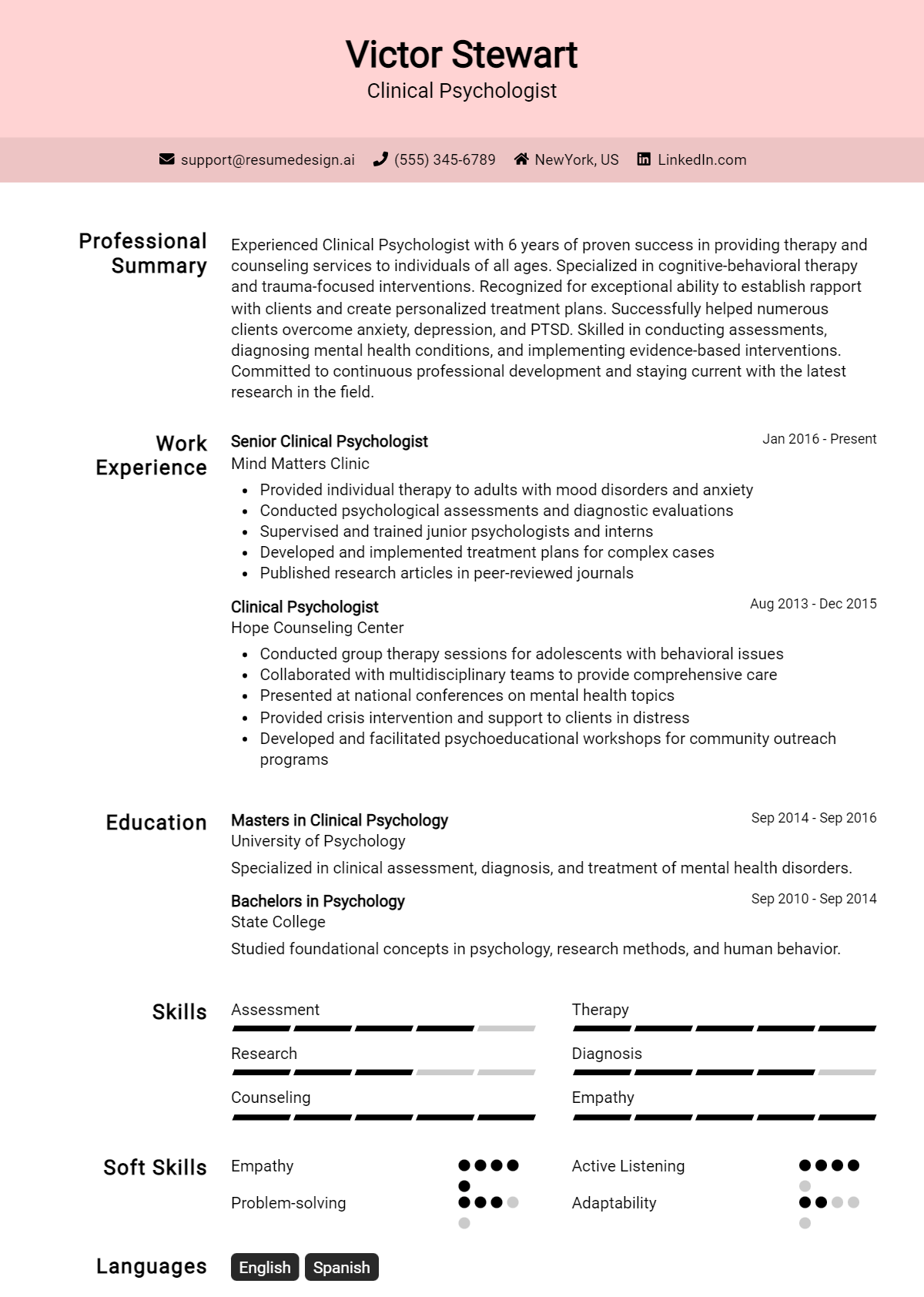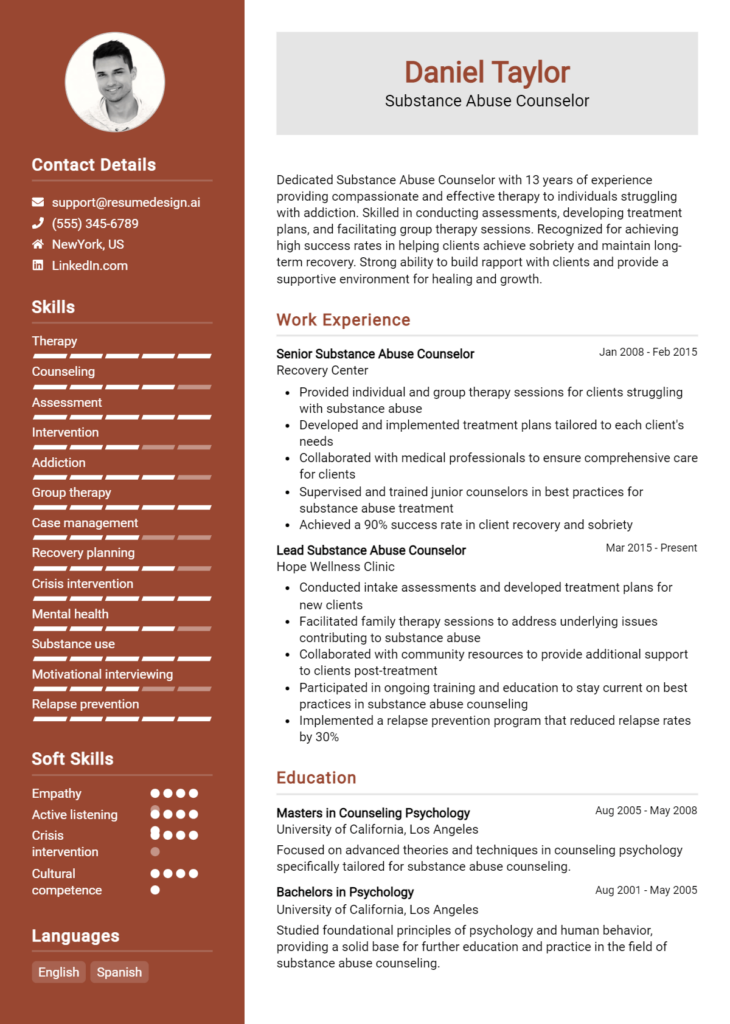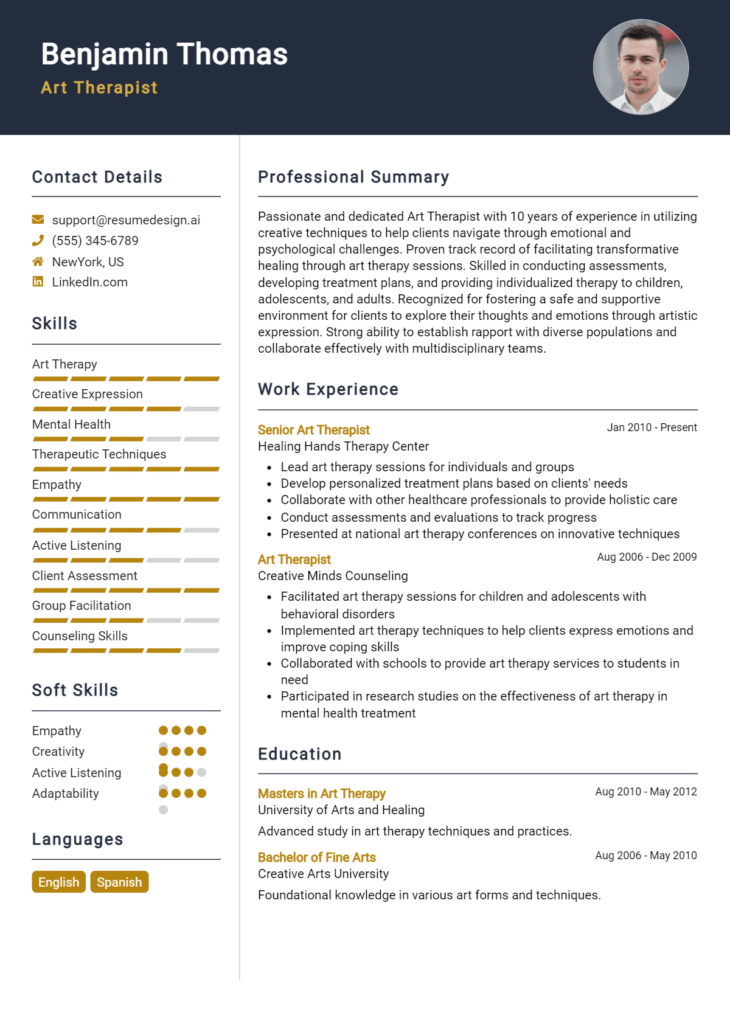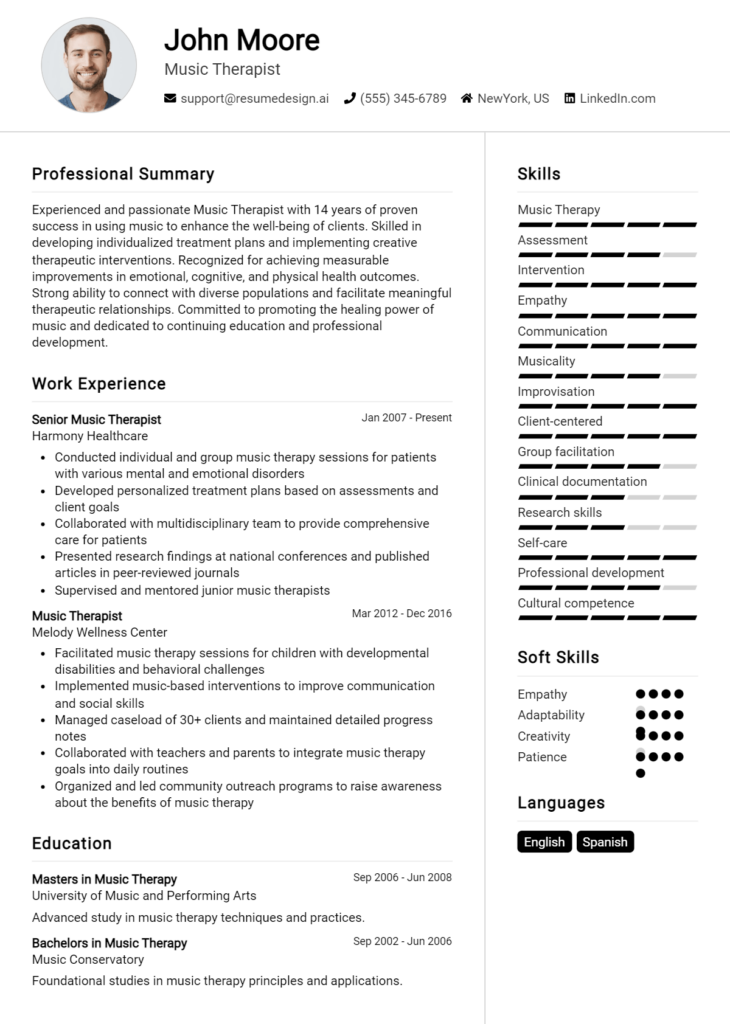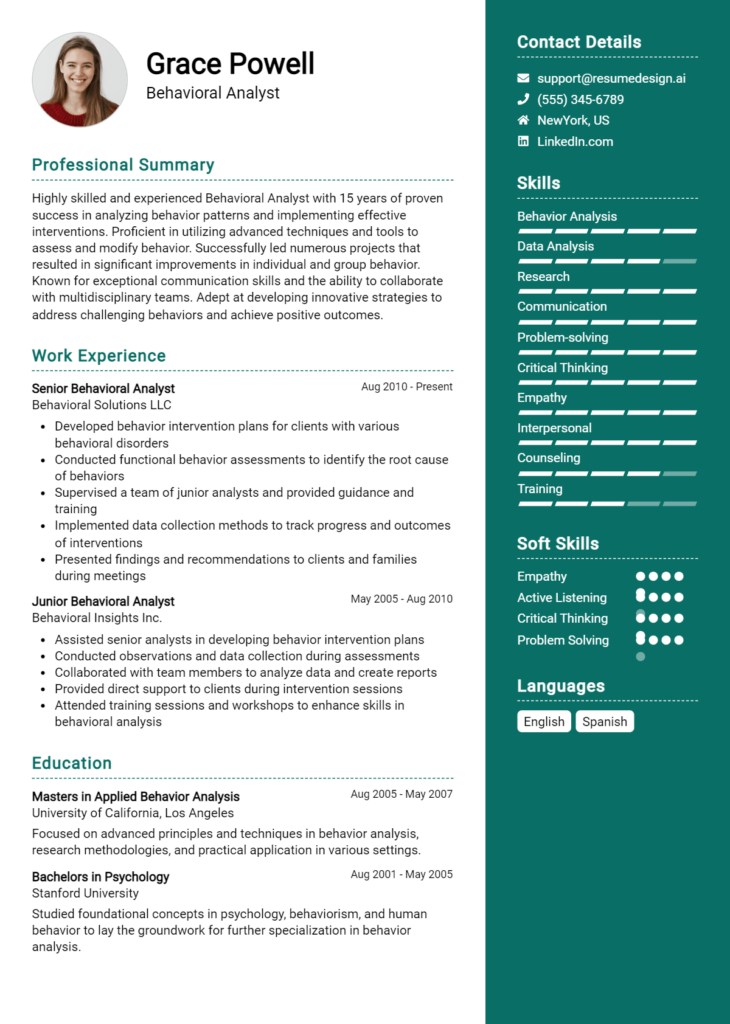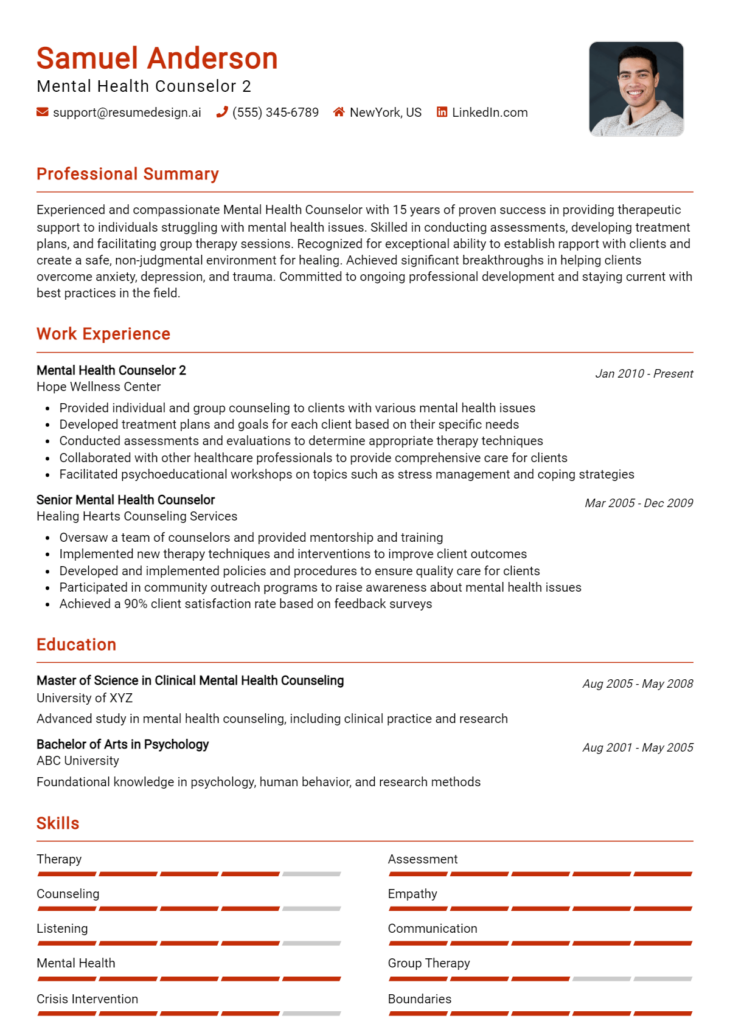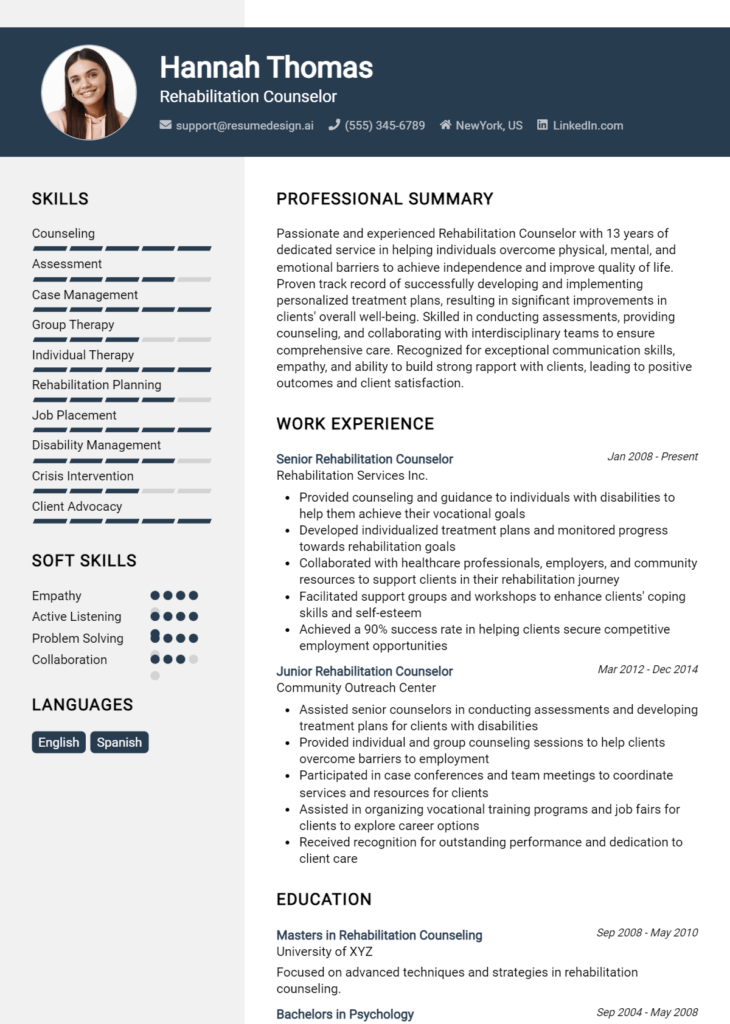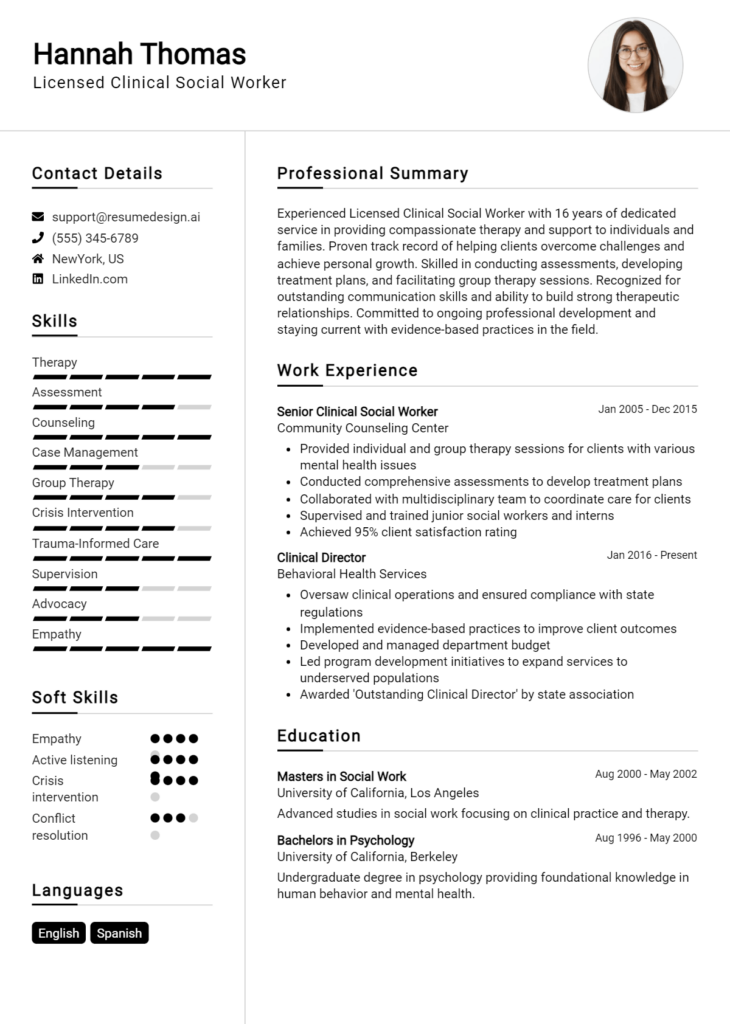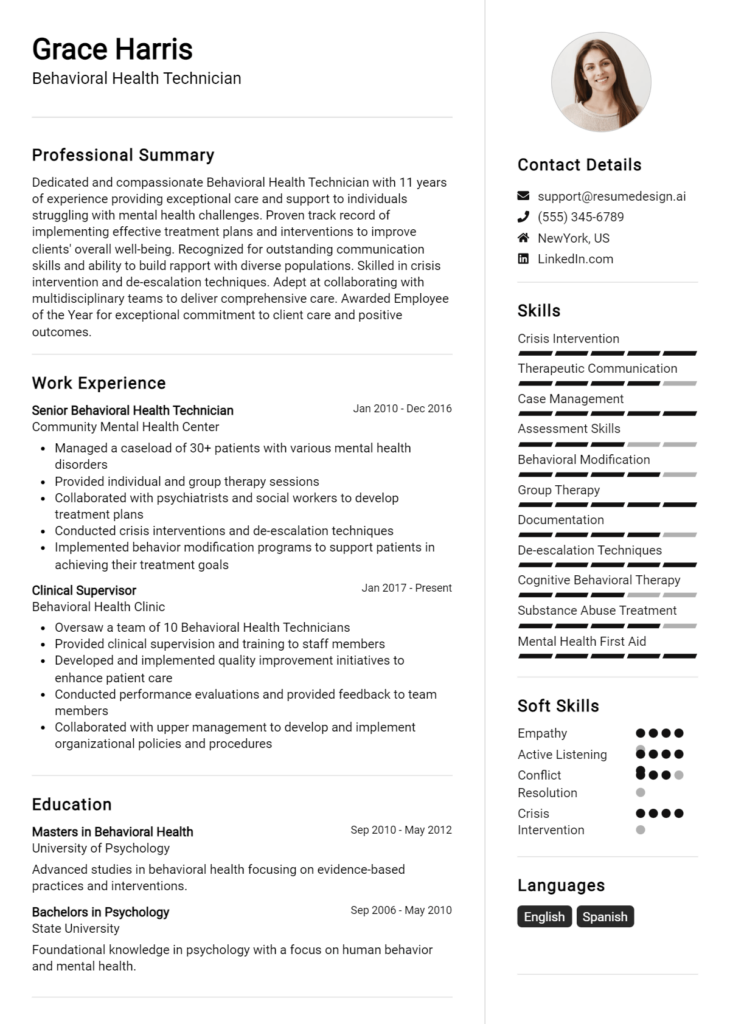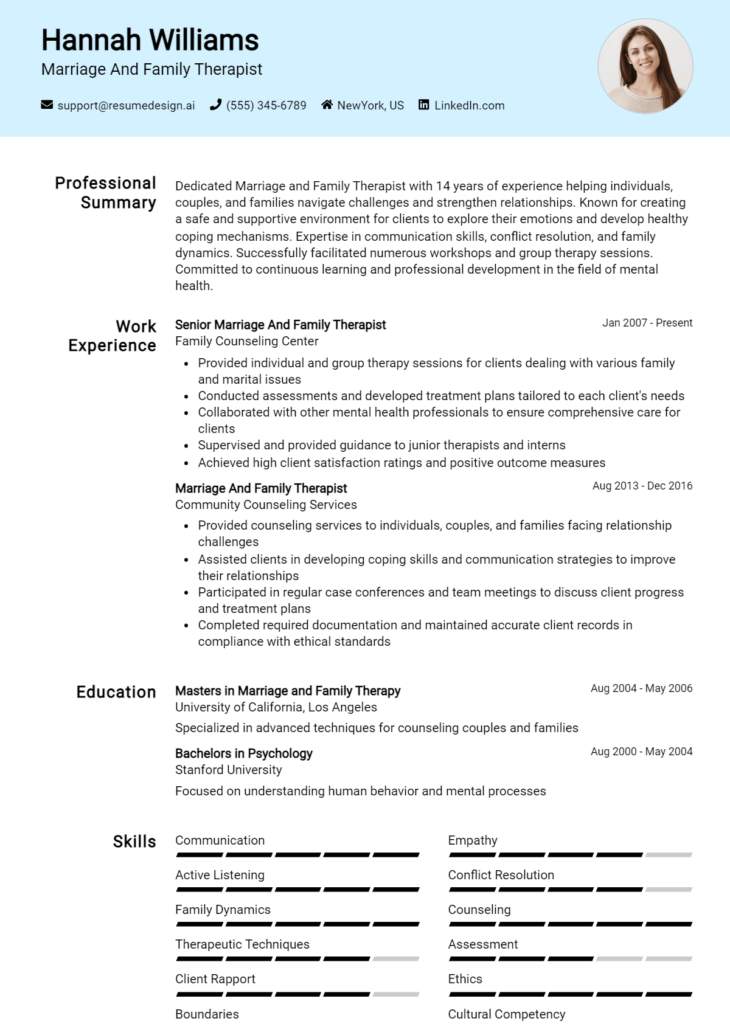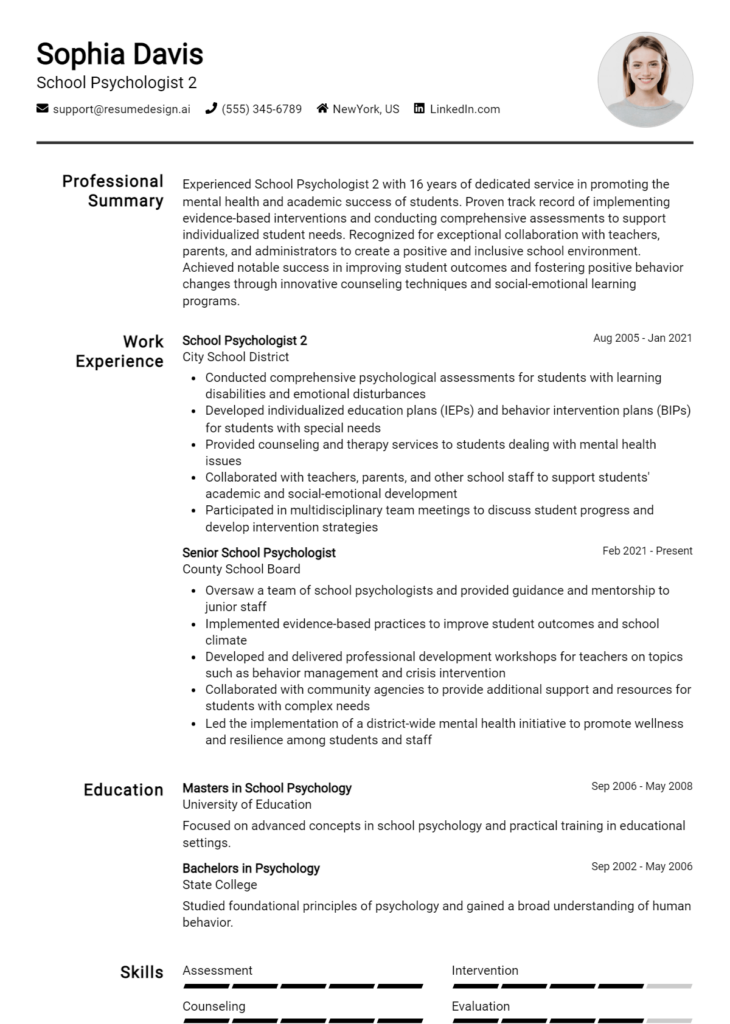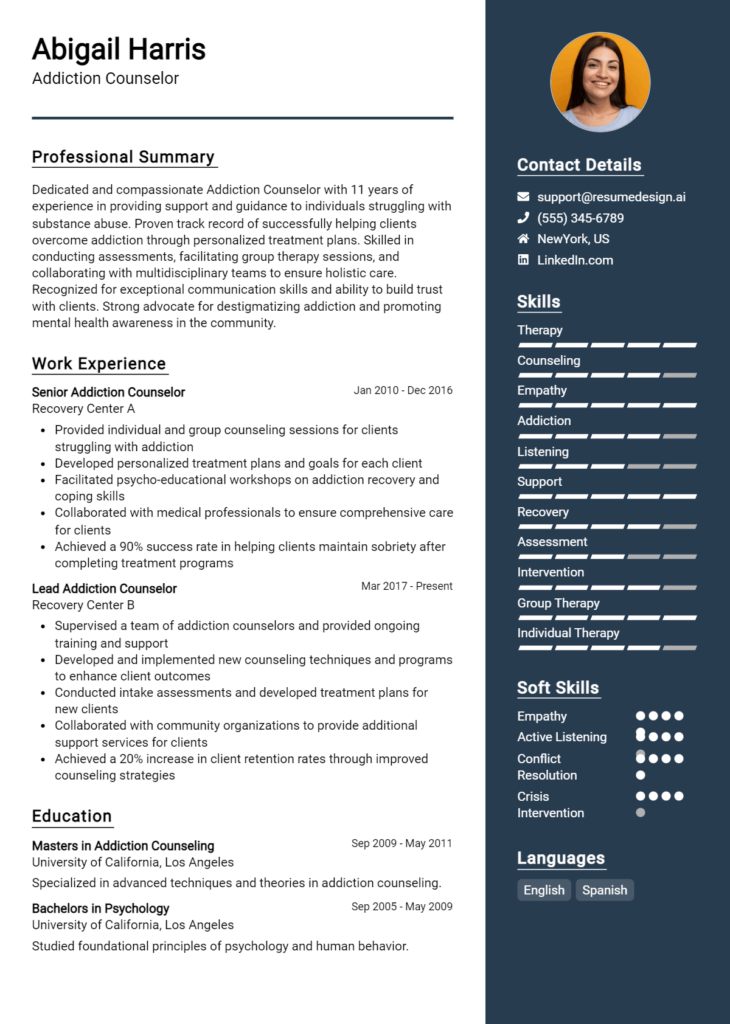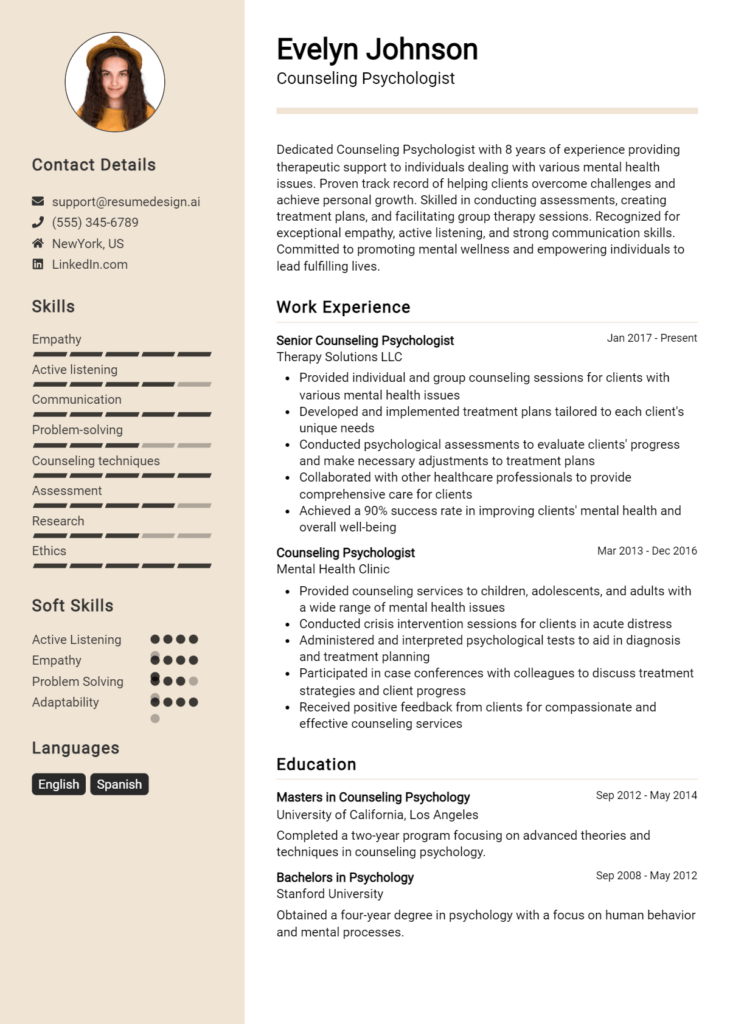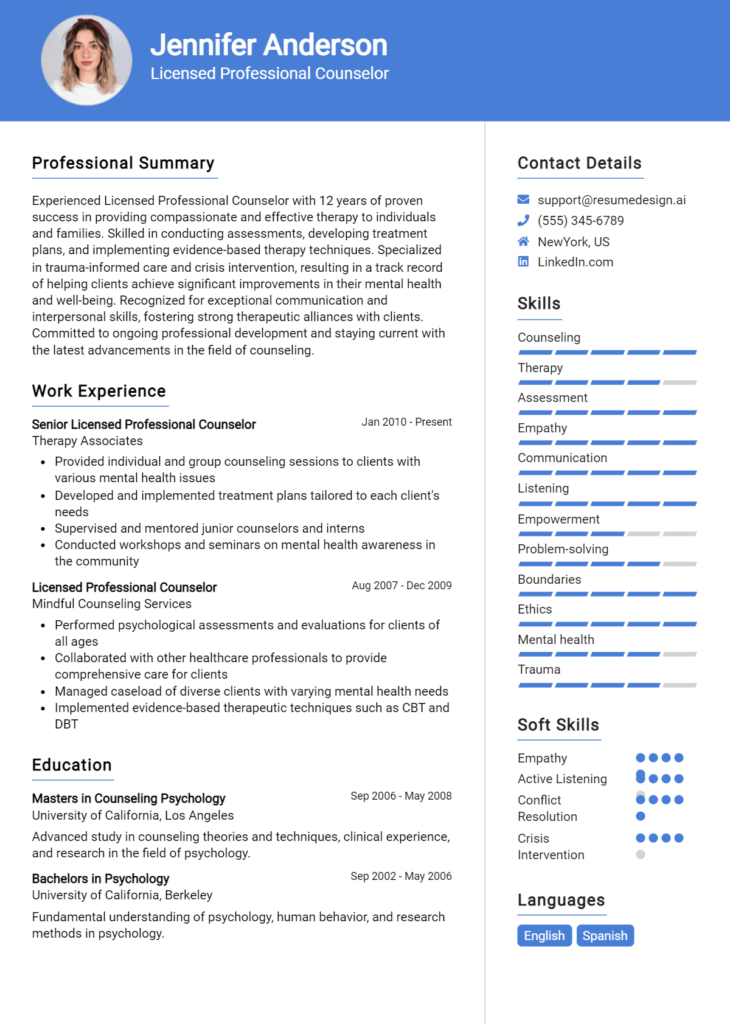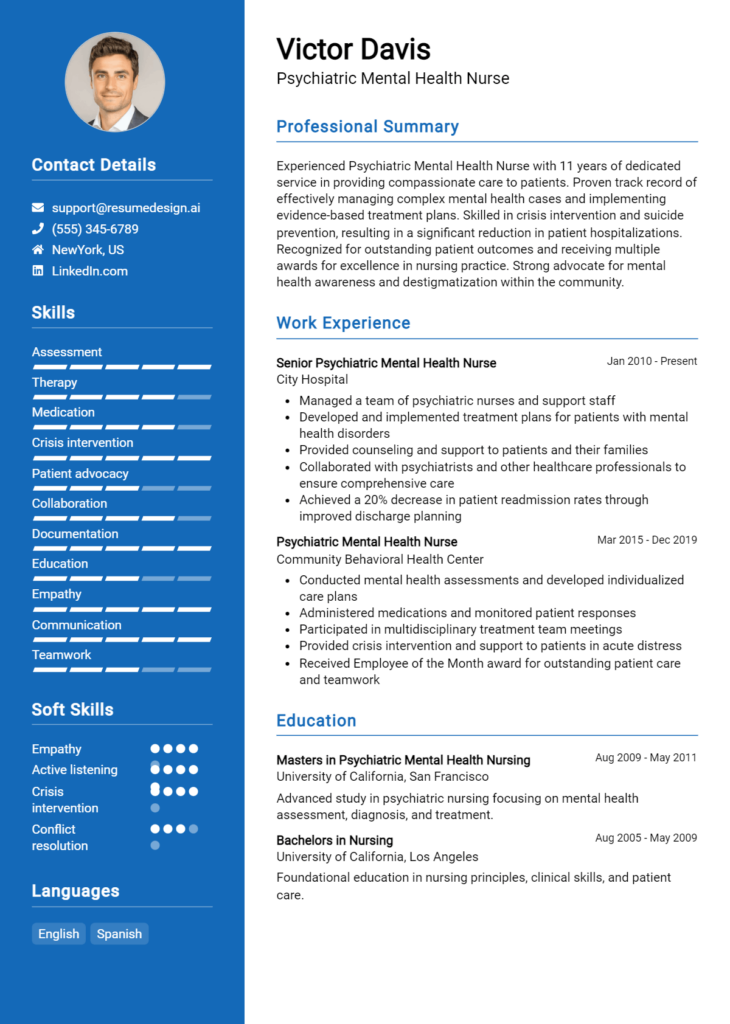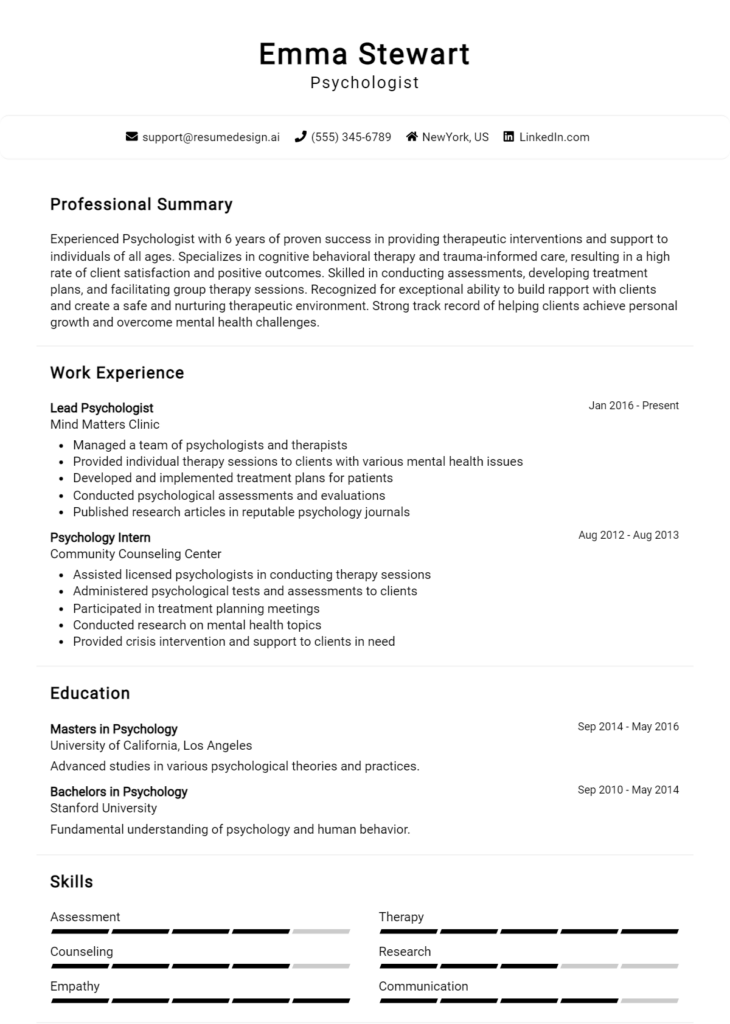Clinical Psychologist Core Responsibilities
A Clinical Psychologist plays a crucial role in mental health care, assessing and treating emotional and psychological disorders. Key responsibilities include conducting psychological evaluations, developing treatment plans, and providing therapy to patients. This role often bridges departments such as psychiatry, social work, and nursing, requiring strong technical and operational skills, as well as exceptional problem-solving abilities. Effective communication and collaboration are essential for achieving organizational goals, and a well-structured resume can highlight these critical qualifications, showcasing a candidate's expertise in the field.
Common Responsibilities Listed on Clinical Psychologist Resume
- Conduct psychological assessments and diagnostic evaluations.
- Develop individualized treatment plans based on patient needs.
- Provide individual and group therapy sessions.
- Implement evidence-based therapeutic interventions.
- Monitor patient progress and adjust treatment plans accordingly.
- Collaborate with multidisciplinary teams to coordinate care.
- Document clinical findings and maintain accurate patient records.
- Educate patients and families about mental health issues.
- Engage in ongoing professional development and training.
- Conduct research and contribute to clinical studies.
- Provide crisis intervention and support as needed.
High-Level Resume Tips for Clinical Psychologist Professionals
In the competitive field of clinical psychology, a well-crafted resume is not just a document; it’s your personal marketing tool that can open doors to new opportunities. As the first impression a potential employer has of you, your resume needs to effectively showcase your skills, achievements, and unique qualifications. It should convey your expertise in psychological assessment, treatment strategies, and patient care in a concise and compelling manner. This guide will provide you with practical and actionable resume tips specifically tailored for clinical psychologist professionals to help you stand out in the job market.
Top Resume Tips for Clinical Psychologist Professionals
- Tailor your resume to each specific job application by aligning your skills and experiences with the job description.
- Highlight relevant clinical experience, including internships, practicums, and supervised training, to demonstrate your hands-on expertise.
- Quantify your achievements, such as the number of patients treated, treatment outcomes, or improvements in patient mental health, to provide concrete evidence of your effectiveness.
- Include industry-specific skills such as cognitive-behavioral therapy (CBT), psychoanalysis, and diagnostic testing to showcase your specialized training.
- Utilize action verbs to describe your responsibilities and accomplishments, making your contributions clear and impactful.
- Incorporate any certifications or licenses you hold, such as Licensed Clinical Psychologist (LCP) or Board Certified in Clinical Psychology, to enhance your credibility.
- Use a clean and professional format, ensuring that your resume is easy to read and visually appealing to hiring managers.
- Highlight any research or publications in the field of psychology to demonstrate your commitment to advancing knowledge and practice.
- Include professional affiliations, such as membership in the American Psychological Association (APA), to show your engagement with the profession.
- Consider adding a brief personal statement or summary at the top of your resume that encapsulates your career goals and professional philosophy.
By implementing these tips, you can significantly enhance your resume and increase your chances of landing a rewarding position in the clinical psychology field. A compelling resume not only reflects your qualifications but also showcases your passion and commitment to helping others, making you a standout candidate in a competitive job market.
Why Resume Headlines & Titles are Important for Clinical Psychologist
In the competitive field of clinical psychology, a well-crafted resume headline or title serves as a critical first impression for potential employers. It encapsulates a candidate’s key qualifications and expertise in a succinct manner, making it easier for hiring managers to quickly assess their fit for the role. A strong headline can effectively grab attention, highlighting the applicant's unique selling points, such as specialized skills or relevant experience. Therefore, it is essential that the headline is concise, relevant, and directly aligned with the job being applied for, ensuring it resonates with the specific requirements of the position.
Best Practices for Crafting Resume Headlines for Clinical Psychologist
- Keep it concise—aim for one impactful sentence or phrase.
- Use relevant keywords that align with the job description.
- Highlight your most significant qualifications or achievements.
- Tailor the headline for each specific job application.
- Incorporate your area of specialization or expertise.
- Use action-oriented language to convey your professional identity.
- Avoid jargon and overly complex terminology.
- Ensure it reflects your professional brand and personality.
Example Resume Headlines for Clinical Psychologist
Strong Resume Headlines
Compassionate Clinical Psychologist Specializing in Cognitive Behavioral Therapy with 5+ Years of Experience
Licensed Clinical Psychologist with Proven Success in Treating Anxiety and Depression in Adolescents
Dedicated Clinical Psychologist with Expertise in Trauma-Informed Care and Family Therapy
Weak Resume Headlines
Psychologist Looking for a Job
Experienced Professional in the Mental Health Field
The strong headlines are effective because they clearly communicate the candidate's specific strengths, areas of expertise, and years of experience, making it easy for hiring managers to identify qualified candidates at a glance. In contrast, the weak headlines fail to impress due to their vagueness and lack of detail, leaving hiring managers uncertain about the candidate's qualifications and suitability for the role. A compelling headline sets the tone for the entire resume and can significantly enhance the chances of securing an interview.
Writing an Exceptional Clinical Psychologist Resume Summary
A resume summary is a critical component for a Clinical Psychologist, as it serves as the first impression for hiring managers. A strong summary quickly captures attention by effectively showcasing key skills, relevant experience, and notable accomplishments. It should encapsulate the candidate's expertise in a concise and impactful manner, tailored specifically to the job being applied for. This targeted approach not only highlights the candidate's fit for the role but also sets the tone for the rest of the resume, making it easier for employers to gauge qualifications at a glance.
Best Practices for Writing a Clinical Psychologist Resume Summary
- Quantify achievements: Use specific numbers to demonstrate your impact, such as the number of clients served or improvement rates.
- Focus on relevant skills: Highlight key competencies like therapeutic techniques, assessment tools, and communication skills.
- Tailor to the job description: Use keywords and phrases from the job listing to align your summary with what the employer is seeking.
- Be concise: Keep the summary brief, ideally between 3-5 sentences, ensuring clarity and impact.
- Showcase professional accomplishments: Mention specific cases or projects that reflect your expertise and success in the field.
- Use action verbs: Start sentences with dynamic verbs to convey a sense of proactivity and effectiveness.
- Highlight continuous education: If applicable, note any advanced certifications or ongoing training that enhance your qualifications.
- Maintain professionalism: Ensure the tone of the summary reflects the professionalism expected in the mental health field.
Example Clinical Psychologist Resume Summaries
Strong Resume Summaries
Dedicated Clinical Psychologist with over 8 years of experience in providing evidence-based therapy to diverse populations, resulting in a 30% improvement in client outcomes. Skilled in cognitive-behavioral therapy and trauma-informed care, with a proven track record of developing personalized treatment plans.
Compassionate and results-driven Clinical Psychologist with a Ph.D. in Clinical Psychology and expertise in adolescent mental health. Successfully reduced anxiety symptoms by 40% in a clinical setting by implementing innovative group therapy programs.
Experienced Clinical Psychologist specializing in substance use disorders, having conducted over 500 individual and group therapy sessions. Known for fostering a supportive environment that promotes recovery and resilience, contributing to a 25% increase in program retention rates.
Weak Resume Summaries
Clinical Psychologist with a lot of experience in therapy and helping people. I am looking for a new job.
Motivated mental health professional seeking opportunities. I have skills in various therapeutic techniques.
The strong resume summaries stand out due to their specificity, quantifiable achievements, and direct relevance to the role of a Clinical Psychologist. They provide clear evidence of the candidate's impact and expertise, making them compelling to potential employers. In contrast, the weak summaries are vague, lack measurable outcomes, and do not effectively convey the candidate's qualifications or fit for the position, which diminishes their effectiveness in a competitive job market.
Work Experience Section for Clinical Psychologist Resume
The work experience section of a Clinical Psychologist resume is a critical component that illustrates the candidate's technical skills and ability to effectively manage teams while delivering high-quality psychological services. This section not only highlights relevant clinical experience but also demonstrates the psychologist's capability to achieve measurable outcomes in patient care and treatment effectiveness. By quantifying achievements and aligning past roles with industry standards, candidates can present themselves as qualified professionals who can contribute significantly to mental health organizations and community well-being.
Best Practices for Clinical Psychologist Work Experience
- Utilize specific clinical terminology to demonstrate technical expertise.
- Quantify achievements with metrics such as patient improvement rates or successful interventions.
- Highlight leadership roles in clinical settings, including team management and supervision.
- Detail collaborative efforts with multidisciplinary teams to enhance patient care.
- Focus on specific populations served and the diversity of clinical practices employed.
- Incorporate relevant certifications or training that contribute to professional development.
- Use action verbs to convey a proactive approach to clinical responsibilities.
- Align experiences with current industry standards to showcase relevance and adaptability.
Example Work Experiences for Clinical Psychologist
Strong Experiences
- Led a team of 5 psychologists in the implementation of a new cognitive behavioral therapy program, resulting in a 30% increase in patient satisfaction scores over 12 months.
- Conducted comprehensive assessments and developed treatment plans for over 200 patients, achieving a 75% improvement rate in mental health outcomes based on follow-up evaluations.
- Collaborated with a multidisciplinary team of healthcare professionals to create a community outreach program, which successfully increased access to mental health services for underserved populations by 40% within two years.
Weak Experiences
- Worked as a psychologist at a clinic.
- Helped some patients with their problems.
- Participated in team meetings occasionally.
The examples categorized as strong highlight specific achievements and quantifiable outcomes, reflecting the individual's expertise and leadership within the clinical setting. They emphasize measurable impacts on patient care and collaboration with teams. In contrast, the weak experiences are vague and lack detail, providing little insight into the candidate's actual contributions or skills. These statements do not convey a sense of accomplishment or professional growth, making them less compelling to potential employers.
Education and Certifications Section for Clinical Psychologist Resume
The education and certifications section of a Clinical Psychologist resume is vital as it provides prospective employers with a clear view of the candidate's academic credentials, specialized training, and commitment to ongoing professional development. This section serves not only to showcase the candidate's foundational knowledge in psychology but also to highlight any industry-relevant certifications that enhance their credibility. By including pertinent coursework, advanced degrees, and specialized training, candidates can effectively demonstrate their alignment with the job role and their dedication to continuous learning in a field that is constantly evolving.
Best Practices for Clinical Psychologist Education and Certifications
- List your highest degree first, including the name of the institution and graduation date.
- Include relevant certifications, such as Licensed Clinical Psychologist or Board Certified in Clinical Psychology.
- Highlight specialized training or workshops that pertain to specific therapeutic techniques or populations.
- Provide details on relevant coursework or research that aligns with the job requirements.
- Use clear and concise language to avoid ambiguity about qualifications.
- Update the section regularly to reflect new certifications or additional training.
- Prioritize information that matches the job description to enhance relevance.
- Consider adding professional development activities that showcase ongoing learning.
Example Education and Certifications for Clinical Psychologist
Strong Examples
- Doctor of Psychology (PsyD) in Clinical Psychology, University of XYZ, May 2020
- Licensed Clinical Psychologist, State Board of Psychology, License #123456, Issued June 2020
- Certificate in Cognitive Behavioral Therapy, ABC Institute, Completed August 2021
- Relevant Coursework: Advanced Psychopathology, Neuropsychology, and Research Methods in Clinical Psychology
Weak Examples
- Bachelor of Arts in Psychology, University of ABC, Graduated 2010 (irrelevant for clinical positions)
- Certification in Life Coaching, XYZ Academy, Issued 2019 (not recognized in clinical settings)
- High School Diploma, XYZ High School, Graduated 2006 (not relevant for a clinical psychologist role)
- Completed an online course in Self-Help Strategies, 2021 (lacks professional recognition)
The strong examples listed are considered relevant and effective because they align closely with the requirements for a Clinical Psychologist role, showcasing advanced degrees, recognized certifications, and specialized training that enhance the candidate's qualifications. In contrast, the weak examples demonstrate outdated or irrelevant qualifications that do not contribute to the candidate's suitability for a clinical position, ultimately diminishing their credibility in a competitive job market.
Top Skills & Keywords for Clinical Psychologist Resume
In the competitive field of clinical psychology, a well-crafted resume is essential for showcasing your qualifications and expertise. Skills play a pivotal role in conveying your capabilities and the value you bring to potential employers. A comprehensive list of both hard and soft skills not only highlights your clinical proficiency but also demonstrates your ability to connect with clients on a personal level. By effectively showcasing your skills, you increase your chances of standing out in a crowded job market and securing an interview. For those looking to refine their resumes, understanding the importance of these skills is crucial, as they serve as the foundation for your professional identity.
Top Hard & Soft Skills for Clinical Psychologist
Soft Skills
- Empathy
- Active Listening
- Communication Skills
- Critical Thinking
- Problem-Solving
- Time Management
- Adaptability
- Cultural Competence
- Emotional Intelligence
- Team Collaboration
Hard Skills
- Psychological Assessment Techniques
- Cognitive Behavioral Therapy (CBT)
- Psychoeducation
- Research Methodology
- Diagnosis and Treatment Planning
- Crisis Intervention
- Familiarity with DSM-5
- Data Analysis
- Ethical and Legal Standards in Psychology
- Knowledge of Psychopharmacology
For more guidance on how to effectively highlight your skills and present your work experience, consider utilizing resources that can help you structure your resume for maximum impact.
Stand Out with a Winning Clinical Psychologist Cover Letter
Dear [Hiring Manager's Name],
I am writing to express my interest in the Clinical Psychologist position at [Company/Organization Name] as advertised on [where you found the job posting]. With a Doctorate in Clinical Psychology and over [X years] of hands-on experience providing psychological assessments, therapy, and support to diverse populations, I am confident in my ability to contribute positively to your team and help clients achieve their mental health goals. My professional background has equipped me with a comprehensive understanding of various therapeutic modalities, including cognitive-behavioral therapy, dialectical behavior therapy, and mindfulness-based approaches.
In my previous role at [Previous Company/Organization Name], I successfully conducted psychological evaluations, developed treatment plans, and facilitated individual and group therapy sessions for clients dealing with a range of issues, including anxiety, depression, and trauma. I take pride in my ability to build rapport with clients and create a safe, non-judgmental environment where they feel comfortable exploring their thoughts and feelings. My commitment to ongoing professional development has also allowed me to stay up-to-date with the latest research and best practices in clinical psychology, ensuring that I provide the highest standard of care.
I am particularly drawn to the mission of [Company/Organization Name] and its dedication to [specific aspect of the organization, such as community mental health, innovative treatment approaches, etc.]. I believe that my values align closely with yours, and I am excited about the opportunity to be part of a team that prioritizes empathy, integrity, and evidence-based practice. I am eager to bring my skills in assessment, treatment planning, and client advocacy to your organization and support your commitment to improving mental health outcomes in our community.
Thank you for considering my application. I look forward to the possibility of discussing how my background, skills, and passion for psychology can contribute to the important work being done at [Company/Organization Name]. Please feel free to contact me at [Your Phone Number] or [Your Email Address] to arrange a conversation.
Sincerely,
[Your Name]
[Your LinkedIn Profile or Professional Website, if applicable]
Common Mistakes to Avoid in a Clinical Psychologist Resume
When crafting a resume as a Clinical Psychologist, it is essential to present your qualifications, skills, and experiences in a way that captures the attention of hiring managers. However, many candidates make common mistakes that can undermine their chances of landing an interview. Understanding these pitfalls can help you create a more effective resume that showcases your expertise and professionalism.
Overloading with jargon: While it’s important to demonstrate your knowledge, using excessive clinical terminology can make your resume difficult to read. Keep language clear and accessible.
Neglecting formatting: A cluttered or inconsistent format can detract from your qualifications. Use clear headings, bullet points, and a clean layout to enhance readability.
Including irrelevant information: Tailor your resume to the job description by focusing on relevant experiences and skills. Avoid listing unrelated jobs or hobbies that do not pertain to clinical psychology.
Lack of quantifiable achievements: Failing to provide specific examples of your accomplishments can weaken your resume. Use metrics to highlight your impact, such as the number of clients treated or improvement rates.
Using a one-size-fits-all approach: Submitting the same resume for every position can be detrimental. Customize your resume for each application by emphasizing the skills and experiences that align with the specific job requirements.
Ignoring professional development: Not mentioning relevant certifications, workshops, or continuing education can leave a gap in your qualifications. Always include any ongoing training that enhances your expertise.
Omitting soft skills: Clinical psychology requires strong interpersonal skills. Failing to highlight qualities such as empathy, communication, and teamwork can give a skewed impression of your capabilities.
Typos and grammatical errors: Attention to detail is crucial in psychology. Spelling mistakes or grammatical errors can suggest carelessness and may lead potential employers to question your professionalism. Always proofread your resume before submission.
Conclusion
As a Clinical Psychologist, you play a vital role in understanding and improving mental health. Throughout this article, we explored the essential skills and qualifications that are typically required for this profession, including expertise in psychological assessment, therapeutic techniques, and strong interpersonal communication. We also highlighted the importance of staying informed about the latest research and trends in psychology to provide the best care for your clients.
In addition to your clinical expertise, having a well-crafted resume is crucial to showcase your qualifications effectively to potential employers. A standout resume can help you differentiate yourself in a competitive job market, emphasizing your unique experiences and skills.
Now is the perfect time to review and enhance your Clinical Psychologist resume. Utilize available resources to elevate your application. Consider checking out resume templates to find a design that suits your professional style. If you need assistance in building your resume from scratch, our resume builder can guide you through the process with user-friendly features. Additionally, explore resume examples for inspiration and ideas to highlight your achievements. Don’t forget the importance of a compelling introduction—our cover letter templates can help you make a strong first impression.
Take action today and ensure your resume effectively represents your skills and qualifications as a Clinical Psychologist!

